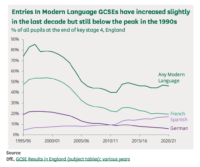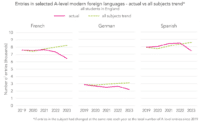-

News -

Services
Every year, students study a variety of subjects at GCSE and A Level. The number of students studying each subject varies annually based on their interests, although it generally remains consistent across subjects. However, it is clear that the study of modern languages (French, German, and Spanish) in the UK is rapidly declining. Since the requirement to study a modern language was removed in 2004, the number of students studying languages has dropped significantly, and in recent years (post-Brexit), it has declined even further. This trend poses a colossal problem for the UK as it seeks to engage in an increasingly globalized world and is of huge concern for the UK’s language industry.
Studying languages in the UK has always been considered less important than in other European countries, given the perception of English being the most spoken language in the world. While English has the greatest number of second language speakers, it is not as dominant as many Anglophones believe, with only around 20% of the world being able to speak English. The most spoken language by native speakers is Mandarin Chinese, with over 1 billion native speakers. This perception among native English speakers has led to a negative attitude towards language learning, resulting in over 90% of the British population being monolingual. Whereas 25 years ago, languages were still popular with students, with over 70% taking a GCSE in a foreign language in 1997.
Language learning in UK schools has significantly declined over the century, with a notable acceleration post-Brexit. While Brexit alone is not the sole factor—educational reforms like the 2016 shift to linear A Levels have made languages appear more challenging and less attractive—the impact of Brexit on language education cannot be underestimated. The post-Brexit visa complexities have made it much harder for schools to hire language teachers and assistants, exacerbating the decline. Additionally, public sentiment towards languages has soured since the EU referendum, likely dampening student enthusiasm for learning foreign languages. This combination of factors highlights a critical period of challenge for language education in the UK, underscoring the need for targeted interventions to reverse the trend.
Despite there not being one clear reason for the decline of languages in the UK, it is evident they are in retreat. In 2023, German had the largest decrease of all subjects studied at A Level, with a 15.9% decrease from the previous year. French and Spanish were also impacted, each reducing by just under 11% at A Level. They had the third and fourth largest decreases, meaning that three out of the four A Level subjects with the biggest drop in students between 2022-2023 were foreign language subjects. The numbers at GCSE are also negative for German and French, which both saw declines in the number of pupils studying these subjects. Although, on the bright side, Spanish has become increasingly popular at GCSE level, with student numbers increasing year on year.
The decline in language studies within the UK’s educational system over the 21st century, particularly in recent times, presents a significant concern. As the demand for linguists grows, the decreasing number of students pursuing languages at both school and university levels marks a critical shortfall in the nation’s language capabilities. This reduction threatens the UK’s economic, diplomatic, and security interests, given its reliance on engaging with non-English speaking countries. In today’s globalized landscape, especially post-Brexit with the UK forging new international relationships, the ability to communicate in multiple languages has never been more vital. Estimates suggest that the language skills gap could be costing the UK economy as much as 3.5% of its GDP annually. Additionally, the translation industry faces challenges due to the dwindling pool of native English speakers with foreign language proficiency. This scarcity not only hampers cross-cultural communication but also poses risks to national security, emphasizing the urgent need for skilled British linguists.
Overall, language learning in the UK education system has always been less important than in other comparable countries. Unlike in most other European countries, learning a foreign language is not considered as important in the UK. This has resulted in a drastic decline in the number of students studying a language at GCSE and A Level. This trend needs to be reversed quickly to ensure British students have the same opportunities to learn a language as their European peers. It must also be reversed to prevent the extinction of these subjects in the UK education system and to prevent the UK from falling behind in an ever-multilingual world.






